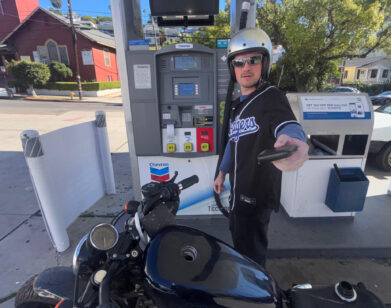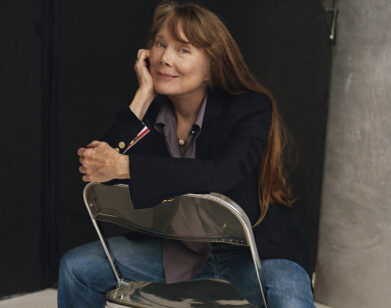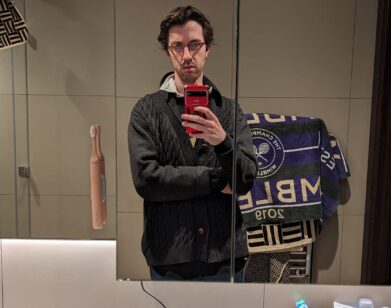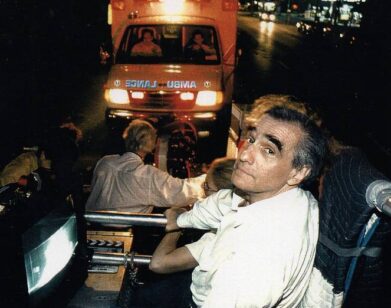Checking In with Marin Ireland
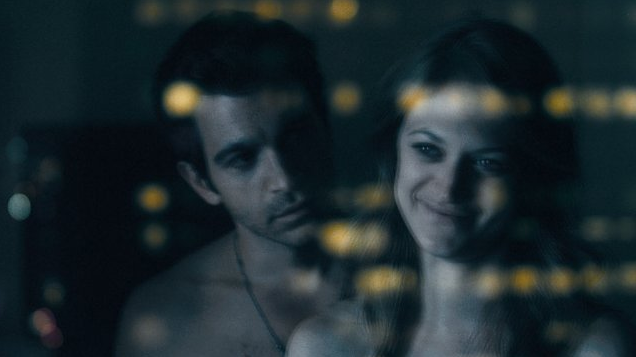
ABOVE: MARIN IRELAND (RIGHT) WITH CHRIS MESSINA IN 28 HOTEL ROOMS.
Marin Ireland digs into her purse to pull out her iPhone. The Homeland actress wants to find a particular picture: herself in a multi-foot tall wig, rising up from her head like a floating thought bubble. It’s the shade of pale pink that’s whisper-light. This is Ireland as Marie Antoinette in a play at Yale, an almost shocking departure from her portrayal of American terrorist Aileen in Homeland, in which she is all jawline and gristle.
Ireland has a savvy intuition for playing women who shield their secrets with intimidating strength. Ireland’s character, whose personal resilience packed an explosive power, just returned to Homeland last Sunday, in the seventh episode of the second season. Ireland also plays an exacting woman in Matt Ross’s sexily bittersweet indie film 28 Hotel Rooms, in theaters today. Her character is magnetic, but just this side of icy.
In person, Ireland is quick to laugh, pull funny faces, and make light. Nominated for a Tony for her turn in Neil LaBute’s 2009 play reasons to be pretty, the actress froths over with her enthusiasm for acting challenges, fascinating scripts, and maintaining a balance between theater and film acting. Next, she’s waiting to hear about an AMC pilot, directed and co-created by Tony Goldwyn; eyeing playing Joan of Arc in George Bernard Shaw’s 1923 play, St. Joan; and will start filming Glass Chin in January, in which she plays the wife of ex-boxer Corey Stoll (Hemingway from Midnight in Paris). Her natural effervescence is a far cry from the gravitas she conveys onscreen—but perhaps it’s the enthusiasm needed to portray these guarded, conflicted, and complicated women.
MAGGIE LANGE: I saw a running thread between your character in Homeland and the woman in 28 Hotel Rooms—a sort of similar detachment.
MARIN IRELAND: Matt [Ross] and Chris [Messina] developed this story for a couple years before I came on board, and something they were interested in was finding the flip-side to female character that shows up in a lot of indie movies, where she’s really quirky and emotionally available and charming and cute. They felt like they were allergic to that at this point, so they were like, “Okay let’s do the opposite of that. I want the guy to be emotionally available and the artist and the girl to be professional, brittle, not available.”
LANGE: Analytical.
IRELAND: Yeah, exactly, analytical—the math brain. And she doesn’t really reveal all of her secrets to him. She’s the opposite of that girl. We’ve seen that other girl, that girl who is cute and has all this energy and reveals everything.
And it is interesting in terms of the Homeland character. I think that it’s kind of the roles that people respond to me in, whatever the quality I bring, maybe I’m just naturally somewhat brittle [laughs]. But in terms of a detachment, there is something interesting there. That is a parallel I hadn’t thought about.
LANGE: You said that people might be responding to a detachment, but there is also a rock-like strength in both of these characters. Is that something that you are drawn to?
IRELAND: It’s such a luxury as an actor to think of your career as something you’re choosing for yourself, because so much of the time as an actor you’re just hoping that exciting projects come your way. The thing I respond to the most is just great writing, interesting characters. I like to think that there is something fun about playing a character that has a lot of authority in her own life. What I like about these two women is also the element of surprise between the two of them, because there is a great possibility for both of them at any moment to reveal things about themselves. [laughs] In one, you’re a threat to homeland security, but in the other you keep secret your emotional life. That’s always fun to play as an actor, something you’re trying to keep hidden from other people. You can reveal it or not, dole it out in doses.
LANGE: Tell me a bit about how 28 Hotel Rooms was filmed. What is sequentially, chronologically?
IRELAND: What Chris and Matt’s idea was that we would shoot what was on the page and then we would sort of riff and be free to do whatever in other moments. There are a lot of scenes in the movie that were not in the script, completely improvised—scenes that were outside of time. They would be setting up lighting in the room and Chris would take me and Matt and the DP into another area and be like: “Just have a fight or something. Like, while are waiting, not to waste any time.” Like the toenail painting scene, which I love. That’s a fun element of the movie that wouldn’t have worked if we hadn’t had the time we had rehearsing and talking through the characters. We just knew the relationship so well and the people. When Matt said to just have a fight or have fun together, just hang out, and talk about your first dates or talk about being kids, we just could. We knew the people so well and we were so comfortable with each other, we could just have fun.
LANGE: In your weeks of rehearsal, did you talk about more your individual characters or the relationship between your characters?
IRELAND: A little of both. There was some discussion about should we show their significant others, should those characters be in a movie, but ultimately that makes it a different movie. Once we thought about opening it up, it became a different thing. We mostly discussed their relationship—if this is something she gets from this person, and this is what he gets from her, what does this say inversely about their personal lives?
LANGE: I think the absence of significant others in the movie has a greater reverb. What was it like to work with just one other person?
IRELAND: Luckily, because Chris and I had done a play together 10 years earlier, at the New York Theater Workshop, just me and Chris and Frances McDormand. He called me up to bring me into this process, bring me in to audition, and it was hard for me to imagine what it would be like if we had just met on this project. I know that happens to people all the time but there was something special. It’s hard for me to imagine doing something this intimate for this long with somebody I didn’t know very well.
LANGE: How did this relationship change?
IRELAND: It’s amazing, you really do start to feel like you know that person, like you are in a relationship with that person. Even though it’s a working relationship, it’s an intimate working relationship, it really starts to bleed, the lines blur a little bit. You’re on set together having fights, you sit in the other room together not knowing what to do, you are just in this incubator. So whatever is happening between the two of you as people is bleeding onto the screen. I was really lucky, because having already known him and respected him and cared about him so deeply, I respected him so much. And the three of us together, that was a kind of idealized atmosphere, really, because whatever needed to happen in the story, there was no other hurdle to get over in terms of comfort level. We had already leap-frogged over.
LANGE: So 28 Hotel Rooms is contained in this lovely way, but did you look to any outside films for inspiration?
IRELAND: There is a movie that Matt loves that he gave me and Chris copies of, called Reprise, it’s this beautiful Norwegian movie. It’s not linear, it jumps around in time, and the style of it—it’s got a rock-‘n’-roll element to it, the way it’s put together in music, and a sudden freeze frame. It’s got a loose, editorial feel to it.
Also the way the sex scenes were, frankly. That’s what he wanted to reference. There are some sex scenes in there that are not done in exploitative way, even though it feels very real. He wanted us to watch those to realize what he was going for. It wasn’t to be sexy necessary or titillating, just real, just to feel like we are existing with these people.
LANGE: Was there a hesitance on your part for sex scenes?
IRELAND: You kind of can only do a movie like this if you think, “Oh, no one will ever see it.” And then you find yourself at Sundance saying, “And there is my butt.” The thing was is that Chris is so comfortable with that stuff, and I’m so comfortable with Chris. And there were times when I was like, “Of course Chris is comfortable, it’s me and him and his two friends,” but for me it was just me and three dudes. But they understood, they got that sometimes talking about it more made it more comfortable. There was just an atmosphere on the set of everyone respecting everyone else’s comfort level. That’s unusual, though, to feel that comfortable in a set, in that scenario. I’ve had to do it once or twice for other movies it really is a strange thing in the air—you either feel comfortable or you don’t. It was a pretty exceptional atmosphere in that regard.
LANGE: In addition to working with just one person, you were essentially working in one space, with that ubiquitous hotel vibe that carries through. How did you respond to the spaces of the film?
IRELAND: When you’re in a hotel room, you find yourself on the bed because, where else are you going to go, that weird little desk? So we were always trying to figure out, how do we work with it. I was staying at the hotels, which added to that feeling of being trapped. But that is sort of the issue, they do feel trapped by it, they do feel claustrophobic. That is something to use to our advantage. As a director, Matt tried to figure out the rare moments we could break out of take, for the audience’s sake. But for us, he said we should use it. There is that scene where Chris is saying, “I just want to get outside.” That is an improvised scene, Matt said to go by the window and have a fight and that’s what we were talking about, being stuck in there.
28 HOTEL ROOMS OPENS TODAY IN LIMITED RELEASE.

